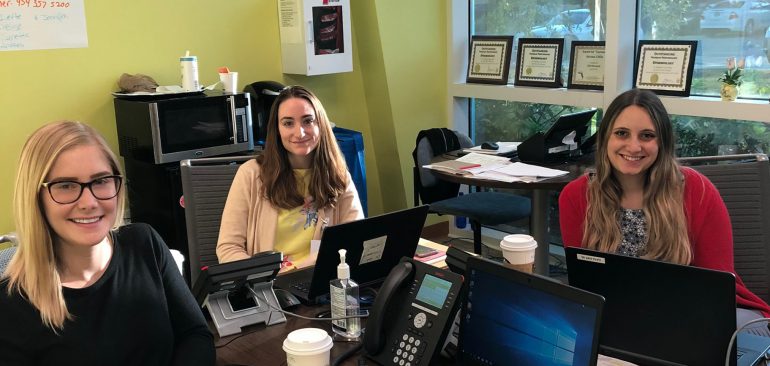On a Saturday afternoon, three University of Florida students got a call from the Florida Department of Health. Could they come to Broward County to help with the COVID-19 response there — and could they start the next morning?
“We all agreed right away,” said Veronica Richards. Richards arrived in Broward County with Emily Klann and Rebecca Fisk, who are also epidemiology Ph.D. students from UF’s College of Public Health and Health Professions and the UF College of Medicine.
“You hang up the phone and it really kicks in: Wow, I need to pack my bags, say goodbye to my loved ones, say goodbye to my animals for two weeks, possibly longer.”
They’re part of a group of 30 UF faculty members and students who answered the call when the state of Florida needed to drastically boost the number of epidemiologists working with health departments around the state. Seventeen students have been deployed into the field; others, like clinical associate professor of epidemiology Cindy Prins and epidemiology lecturer Jerne Shapiro, are helping in the Gainesville area.
“I’m incredibly proud of these students,” said Prins, director of the Master of Public Health program and an assistant dean for educational affairs for the College of Public Health and Health Professions. “They want to help so badly. All of our students do.”
Six days a week, the Broward group reports to the county health department, where they call people who have or have been exposed to COVID-19. They painstakingly trace who patients have been in close contact with, answering questions as best they can, looking for patterns that could help identify how the disease is spreading.
Being on the frontlines of the #COVID2019 pandemic has been a sobering experience. I have been witnessing the devastation that this virus is capable of on a daily basis. I am begging all of you to heed #CDC guidance and #StayHome.
Another Ph.D. student, Upuli Dissanayake, was deployed to Osceola County.
“This is a learning opportunity for me at every stage, but also an opportunity to use my skill sets to be able to go out there and help,” she said.
Not long ago, she had to explain to people outside the field what epidemiology is.
“People confused it with dermatology,” she said. Now that her field is in the news, she hopes people will appreciate the scientists who interpret public health data to understand and slow the outbreak.
Dissanayake works 11- to 12-hour days, and, like the Broward students, returns to a hotel devoid of tourists to watch online lectures for doctoral classes, do homework and keep up with research duties. Some of the students are also juggling their work as teaching assistants, answering student questions and grading papers.
Working on the front lines of an unprecedented outbreak, they’ve formed a support network with their peers from UF and other state universities, as well as health department staff.
“There’s really no sense of normalcy to any of this, if I’m being completely honest,” Dissanayake said. “But there’s a camaraderie between us.”
Their deployments were intended to last two weeks, but several of the students have already extended their stays, and more have been called up to additional counties.
“They’re getting epidemiology experience I can’t teach in the classroom,” Shapiro said. “I can only say wonderful things about the students stepping up and level of commitment they are devoting to help protect people.”
Hear the students describe their lives on the front lines of COVID-19 on the UF News Soundcloud.
This article was originally adapted from UF News.

